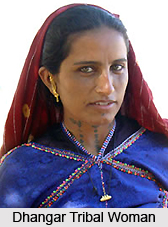 Dhangar is an aboriginal tribe of India. Members of this tribal community are basically shepherds and blanket weavers. Dhangar caste is principally located in the state of Maharashtra. The term Dhangar literally means wealthy. The name of this tribal group has been derived from Sanskrit word `Dhenu`, meaning cow. The Dhangar caste is also known by different other names like Dhangad, Dhangar and Dhanpal. It is said that during the times of suffering some of the Kshatriyas went to hills and mountains with their cow and sheep and began to live in the forests. Eventually, these people came to be known as Dhangars. Dhangar community mainly resides in Nagpur District, Wardha District, Chanda District. The traditional profession of the Dhangars is to tend sheep and goats.
Dhangar is an aboriginal tribe of India. Members of this tribal community are basically shepherds and blanket weavers. Dhangar caste is principally located in the state of Maharashtra. The term Dhangar literally means wealthy. The name of this tribal group has been derived from Sanskrit word `Dhenu`, meaning cow. The Dhangar caste is also known by different other names like Dhangad, Dhangar and Dhanpal. It is said that during the times of suffering some of the Kshatriyas went to hills and mountains with their cow and sheep and began to live in the forests. Eventually, these people came to be known as Dhangars. Dhangar community mainly resides in Nagpur District, Wardha District, Chanda District. The traditional profession of the Dhangars is to tend sheep and goats.
The Dhangars worship an ant-hill, and never remove it from their fields. They worship it on the occasion of Diwali by making offerings of rice and flowers. Dhangar caste is divided into several sub-castes namely Varadi or Barade, belonging to Berar; Kanore or Kanade, of Kanara; Jhade, or those belonging to the Bhandara, Telange, belonging to the Telugu country; Balaghat District and Chhindwara District; Marathe, of the Maratha country; Mahurai from Mahur in Hyderabad, and others. In Dhangar society, a number of exogamous sects or groups exist which are classified as per their nomenclature as titular and totemistic many of them also have the names of other castes. Names of some of the exogamous sects of Dhangar caste are Powar, a Rajput sept; Dokra, an old man; Marte, a murderer or slayer; Sarodi, the name of a caste of mendicants; Mhali, a barber; Kaode, a crow; Chambhade, a Chamar; Juade, a gambler; Lamchote, long-haired; Bodke, bald-headed; Khatik, a butcher; Chandekar, from Chanda; Moya, a grass, and so on. The names of the sects indicate that Dhangar caste is a functional one with mixed composition.
In Dhangar community, marriages within the same exogamous sept are prohibited. Further, marriages between first cousins are also not allowed. Marriages can either be adult or infant and they allow polygamy. Wedding ceremonies are mostly held during the rainy season. It is because Dhangar people remain at home. They also permit widow re-marriage and divorce. Dhangars worship Mahadev and also observe all the Hindu festivals. New born babies are usually named on the 12th day after birth. They bury the dead and observe several set funeral rites and mourning for ten days. They employ a Brahmin priest for performances of different rites. Women members of the caste wear a lot of ornaments. The Dhangars are dark skinned.
















